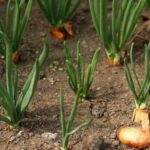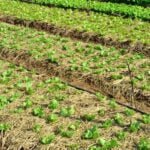Are you wondering, “Is mushroom soil good for vegetable gardens?” Well, the answer might surprise you. Mushroom soil, also known as spent mushroom substrate, is a byproduct of the mushroom farming industry that is rich in nutrients and organic matter. This nutrient-dense material can be a valuable addition to your vegetable garden, providing a boost to plant growth and yield.
Mushroom soil is a blend of organic materials such as straw, corn cobs, peat moss, and various agricultural byproducts that have been used to grow mushrooms. After the mushrooms have been harvested, the remaining substrate is packed with beneficial nutrients like nitrogen, phosphorus, potassium, and trace minerals. This makes mushroom soil an excellent amendment for enriching the soil in your vegetable garden and promoting healthy plant growth.
In this article, we will explore the advantages of using mushroom soil in vegetable gardens, highlighting its benefits for plant health and productivity. Additionally, we will discuss the composition of mushroom soil in detail, shedding light on the nutrients and components that make it a valuable resource for gardeners. Stay tuned to learn how you can incorporate mushroom soil into your vegetable garden for optimal results.
Composition of Mushroom Soil
Mushroom soil, also known as spent mushroom substrate, is a byproduct of the mushroom farming industry. It is comprised of a mixture of organic materials such as straw, corn cobs, gypsum, and other nutrients used to cultivate mushrooms. As the mushrooms grow, they extract essential nutrients from the substrate, leaving behind a nutrient-rich material that is excellent for gardening purposes.
The composition of mushroom soil varies depending on the type of mushrooms grown and the specific growing process used by the farm. However, generally speaking, mushroom soil is rich in organic matter and essential nutrients that are beneficial for plant growth. Some common components found in mushroom soil include nitrogen, phosphorus, potassium, calcium, magnesium, and trace minerals like zinc and copper.
Below are some key components and nutrients typically found in mushroom soil:
- Organic matter: Provides food for beneficial microorganisms in the soil
- Nitrogen: Essential for healthy leafy growth
- Phosphorus: Promotes root development and flowering
- Potassium: Aids in overall plant health and disease resistance
- Calcium: Important for cell wall structure
These components work together to create a fertile growing medium that can benefit vegetable gardens in numerous ways. By incorporating mushroom soil into your garden beds or raised beds, you can improve soil structure, increase water retention capacity, enhance nutrient availability to plants, and promote healthy microbial activity in the soil. Mushroom soil acts not only as a source of nutrition for plants but also helps to improve overall soil quality over time.
Advantages of Using Mushroom Soil in Vegetable Gardens
Mushroom soil, also known as spent mushroom substrate, is a byproduct of the mushroom farming industry. It is a nutrient-rich material that has numerous benefits for vegetable gardens. One of the primary advantages of using mushroom soil in vegetable gardens is its high organic matter content. This organic matter helps improve soil structure, promotes better drainage, and enhances moisture retention, creating an ideal environment for vegetable plants to grow and thrive.
In addition to its organic matter content, mushroom soil is also rich in essential nutrients such as nitrogen, phosphorus, potassium, and micronutrients. These nutrients are crucial for the healthy growth of vegetables and can help increase yields. Furthermore, mushroom soil typically has a neutral pH level, making it suitable for a wide variety of vegetables. This balanced pH level reduces the need for additional amendments to adjust soil acidity or alkalinity.
Another advantage of using mushroom soil in vegetable gardens is its ability to suppress weeds and reduce the likelihood of certain plant diseases. The unique properties of mushroom soil can help smother weed growth by blocking out sunlight and preventing weed seeds from germinating.
Additionally, some studies have shown that mushroom soil contains beneficial microorganisms that can help suppress harmful pathogens in the soil. Overall, incorporating mushroom soil into your vegetable garden can lead to healthier plants, higher yields, and reduced maintenance requirements.
Potential Drawbacks of Mushroom Soil
Mushroom soil, also known as mushroom compost, is a byproduct of the mushroom growing process. While it has many benefits for vegetable gardens, there are some potential drawbacks to consider when using this soil amendment.
One concern is that mushroom soil can be quite alkaline, which may not be ideal for all types of vegetables. It is essential to test the pH level of the mushroom soil before using it in your garden to ensure it will meet the specific needs of your crops.
In addition to its alkalinity, another drawback of mushroom soil is that it can contain high levels of salts. Excess salt in the soil can harm plants by causing dehydration and inhibiting nutrient absorption. To mitigate this issue, it is recommended to leach the mushroom soil before incorporating it into your vegetable garden. This can be done by thoroughly watering the soil and allowing excess salts to drain away.
Furthermore, another potential concern when using mushroom soil in vegetable gardens is the presence of any residual pesticides or chemicals from the mushroom cultivation process. It is crucial to source mushroom soil from reputable suppliers that follow organic practices to minimize any risks associated with chemical residues. Conducting research on the supplier’s growing methods and certifications can help ensure you are getting safe and high-quality mushroom soil for your garden.
| Concerns | Recommendations |
|---|---|
| Alkalinity | Test pH level before use |
| High salt content | Leach before incorporating into garden |
| Pesticides/chemical residues | Source from reputable suppliers with organic practices |
How to Use Mushroom Soil in Vegetable Gardens
Mushroom soil, also known as spent mushroom substrate or mushroom compost, is a nutrient-rich byproduct of the mushroom growing process. It is composed of various organic materials such as straw, corn cobs, gypsum, and other agricultural byproducts that have been used to cultivate mushrooms. This creates a fertile soil amendment that is beneficial for vegetable gardens due to its high levels of nutrients and organic matter.
When incorporating mushroom soil into your vegetable garden, it is important to first assess the quality of the soil in your garden beds. Mushroom soil can be used as a topdressing layer or mixed into existing soil to improve its texture and nutrient content. Before application, ensure that the mushroom soil has been properly aged or composted to prevent any potential issues with high salt levels or nitrogen depletion.
To use mushroom soil effectively in your vegetable garden, follow these steps and tips:
- Prepare your garden beds by removing any weeds and loosening the soil.
- Spread a layer of mushroom soil on top of the prepared bed, approximately 2-3 inches thick.
- Gently mix the mushroom soil into the existing topsoil using a gardening fork or shovel.
- Water the area thoroughly to help activate the nutrients in the mushroom soil and promote microbial activity.
- Monitor your plants for any signs of nutrient deficiencies or excesses and adjust your watering and fertilizing accordingly.
Incorporating mushroom soil into your vegetable garden can help improve soil structure, promote healthy plant growth, and increase overall productivity. By following these steps and tips for using mushroom soil effectively, you can create a thriving environment for your vegetable crops to flourish.
| Steps | Tips |
|---|---|
| Prepare garden beds by removing weeds | Ensure proper aging/composting of mushroom soil |
| Spread a 2-3 inch layer of mushroom soil | Monitor plants for nutrient deficiencies/excesses |
| Mix mushroom soil into existing topsoil | Water thoroughly after application |
Best Vegetables to Grow in Mushroom Soil
When considering using mushroom soil in your vegetable garden, it is important to choose the right vegetables that will thrive in this nutrient-rich environment. Mushroom soil, also known as spent mushroom substrate, offers a unique blend of nutrients and beneficial microorganisms that can benefit certain vegetable crops. Here are some recommendations for the best vegetables to grow in mushroom soil:
Leafy Greens
Leafy greens such as lettuce, spinach, and kale are excellent choices for growing in mushroom soil. These vegetables typically have shallow root systems and thrive in nutrient-rich environments. The organic matter and essential nutrients found in mushroom soil can help promote healthy leafy green growth, leading to bountiful harvests.
Tomatoes
Tomatoes are another vegetable that does well when grown in mushroom soil. The rich organic content of mushroom soil provides ample nutrients for tomato plants to develop strong roots and produce plenty of flavorful fruits. Additionally, the beneficial microorganisms present in mushroom soil can help protect tomato plants from certain diseases.
Peppers
Peppers, including bell peppers and chili peppers, are also great options for growing in mushroom soil. These warm-season vegetables thrive in well-draining soil with plenty of organic matter, making them well-suited for the nutrient-rich environment provided by mushroom soil. With proper care and maintenance, peppers grown in mushroom soil can yield a plentiful crop throughout the growing season.
Comparing Mushroom Soil to Other Soil Amendments
When it comes to choosing the best soil amendment for your vegetable garden, there are several options available. One popular choice that many gardeners consider is mushroom soil. But how does mushroom soil compare to other types of soil amendments? Let’s take a closer look at the differences and similarities between mushroom soil and other common soil amendments:
- Compost: Compost is a well-known and widely used soil amendment that is comprised of decomposed organic matter. While both compost and mushroom soil provide essential nutrients to plants, mushroom soil typically has a higher nutrient content due to its composition of spent mushroom substrate mixed with additional organic materials.
- Manure: Manure is another popular choice for enriching the soil in vegetable gardens. While manure can offer valuable nutrients, it may contain pathogens or weed seeds that need proper composting before use. In contrast, mushroom soil is usually free from such concerns and ready to use right away.
- Peat Moss: Peat moss is a lightweight organic material commonly used to improve soil structure and water retention. While peat moss can be beneficial in certain situations, it lacks the nutrient content found in mushroom soil, making it less effective as a standalone amendment for vegetable gardens.
Ultimately, when considering which soil amendment to use in your vegetable garden, it’s important to think about the specific needs of your plants, as well as the overall composition and quality of the soil. Mushroom soil offers a unique blend of nutrients and benefits that make it a valuable addition to any vegetable garden.
Its rich organic matter content promotes healthy plant growth and can help improve overall soil quality over time. Be sure to evaluate your gardening goals and consider incorporating mushroom soil into your growing strategy for bountiful harvests.
Conclusion
In conclusion, mushroom soil can be a valuable addition to your vegetable garden. Its rich composition of nutrients and beneficial properties make it a great choice for promoting healthy plant growth and improving soil quality. With its ability to retain moisture, enhance soil structure, and provide essential nutrients, using mushroom soil in your vegetable garden can lead to bountiful harvests and thriving plants.
While there are some potential drawbacks to consider, such as the need for careful handling due to high salt content or the possibility of introducing unwanted fungi or pathogens, these concerns can be addressed with proper application and monitoring. By following best practices for using mushroom soil in your vegetable garden, you can mitigate any risks and maximize the benefits it has to offer.
Ultimately, when deciding whether mushroom soil is good for your vegetable garden, consider factors like your garden’s specific needs, the types of vegetables you plan to grow, and how you can effectively incorporate mushroom soil into your gardening routine. With its unique advantages and versatility, mushroom soil can be a valuable tool for cultivating healthy and productive vegetable gardens.
Frequently Asked Questions
Can I Use Mushroom Soil in My Vegetable Garden?
Yes, you can use mushroom soil in your vegetable garden as it is a nutrient-rich organic material that can improve soil structure and fertility. However, it’s essential to ensure that the pH level is suitable for your specific vegetables.
What Plants Do Not Like Mushroom Compost?
Some plants do not like mushroom compost because of its alkaline nature and high mineral content. Acid-loving plants such as blueberries, azaleas, and rhododendrons may not thrive with the use of mushroom compost due to the potential imbalance in pH levels.
When Should You Not Use Mushroom Compost?
It is advised not to use mushroom compost when planting seeds or young seedlings, as the high mineral content might be too strong for delicate roots at an early stage of growth.
Additionally, if you are growing plants that prefer acidic soil conditions, it’s best to avoid using mushroom compost altogether to prevent any negative impact on their health and development.

If you’re looking to get into vegetable gardening, or are just looking for some tips on how to make your current garden better, then you’ve come to the right place! My name is Ethel and I have been gardening for years. In this blog, I’m going to share with you some of my best tips on how to create a successful vegetable garden.





